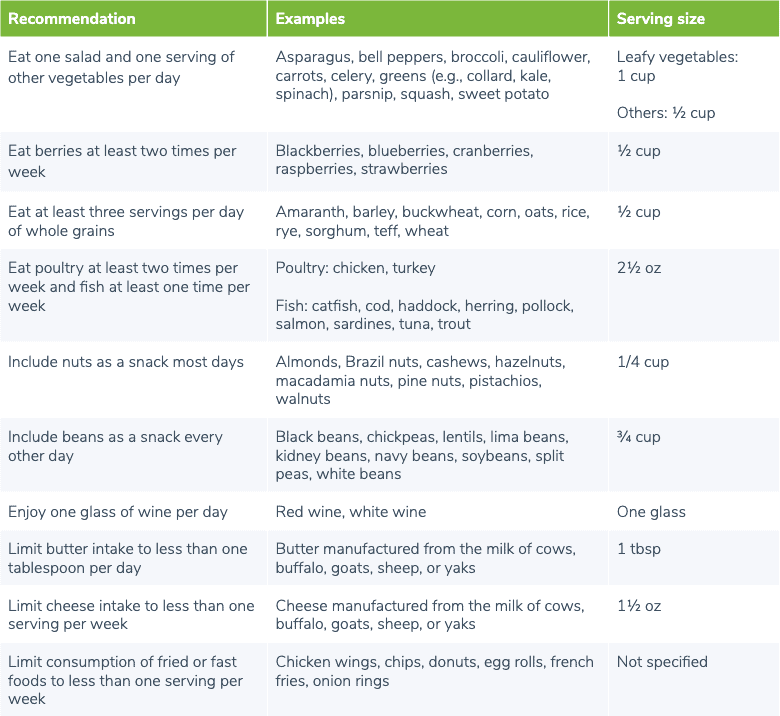
What is the MIND diet?
The Mediterranean-DASH Intervention for Neurodegenerative Delay, commonly referred to as the MIND diet, combines components of the Mediterranean diet and the DASH diet, while uniquely emphasizing the intake of neuroprotective foods. (9) The Mediterranean Diet (MD) is a dietary pattern based on the traditional dietary and lifestyle habits of individuals living in the Mediterranean region. The diet is composed primarily of minimally processed, nutrient-dense, plant-based foods, including cold-pressed extra-virgin olive oil (EVOO), vegetables, fruits, whole grains, legumes, nuts, and seeds. The diet also allows for the moderate consumption of lean meats, fish, dairy, and red wine, white it limits the consumption of red meat, refined and processed foods, and sugars. (5)(12) The Dietary Approaches to Stop Hypertension (DASH) diet is a dietary intervention for cardiometabolic conditions, commonly recommended to reduce blood pressure and prevent cardiovascular disease. The DASH diet emphasizes the intake of vegetables, fruit, whole grains, lean meats, nuts, and low-fat dairy. Intake of fat, red meat, sweets, and sugar-containing beverages is restricted. (11) Similarly to the MD and the DASH diet, the MIND diet is a plant-based pattern of eating that limits the intake of animal foods and foods high in saturated fat. While both the Meditteranean and DASH diets demonstrate cardioprotective effects that may support cognitive health, they do not specifically emphasize the inclusion of neuroprotective foods. With this in mind, the MIND diet was developed based on results from nutrition literature highlighting dietary nutrients that have been shown to support cognitive health, particularly in the aging brain. (9)
Benefits of the MIND diet
Adherence to the MIND diet has been associated with improved cognition (6) and slower rates of cognitive decline. (7)(9) Preliminary research has also demonstrated a reduced risk and slower progression of certain neurodegenerative conditions associated with aging, including Parkinson’s disease (1) and Alzheimer’s disease (AD). (6)Cognitive decline
One study examined the effects of the MIND diet in 960 participants of the Memory and Aging Project over approximately five years. Results of the study positively associated this dietary pattern with significantly slower cognitive decline as participants aged. (8) Another study of 16,058 female nurses aged 70 and older found that moderate improvements in verbal memory in later life were associated with long-term adherence to the MIND diet. However, the researchers also noted that future studies should examine the effects of the diet specifically within populations at a high risk of cognitive decline. (2)Alzheimer’s disease
A 2015 prospective study compared the effects of the MIND, Meditteranean, and DASH diets on the risk of AD, a form of dementia. In the study, 923 participants between the ages of 58 and 98 were instructed to follow one of the diets over approximately four and a half years. Results of the study demonstrated that high adherence to any of the three diets may reduce the risk of AD. However, unlike the MD and DASH diet, even mild adherence to the MIND diet may have significant protective effects against Alzheimer’s disease symptoms. (9)Parkinson’s disease
Oxidative stress and inflammation have been identified as two possible mechanisms involved in the development of Parkinson’s disease. It has therefore been hypothesized the MIND diet may reduce the risk of Parkinson’s disease as a result of its antioxidant and anti-inflammatory properties. A study compared the effects of the MIND diet, the MD, and the DASH diet on the incidence and progression of parkinsonism. Results demonstrated that the MIND diet was associated with both a reduced risk and slower progression of Parkinson’s disease in older adults. Comparatively, there was only a slight association between the MD and progression of the condition, and no association between the DASH diet and either outcome. (1)
Components of the MIND diet
As previously stated, the MIND diet specifies the intake of certain foods that uniquely support brain and cognitive health, such as green leafy vegetables and berries. (1)(6) This may account for its preventative effects and superior benefits for individuals suffering from cognitive decline, including Alzheimer’s disease and Parkinson’s disease. (1)
15 foods to include and avoid on the MIND diet
Ten foods to include:
- Beans
- Berries
- Extra virgin olive oil
- Fish
- Green leafy vegetables
- Nuts
- Poultry
- Vegetables (all other)
- Whole grains
- Wine
Five foods to limit or avoid:
- Butter and stick margarine
- Cheese
- Fried or fast foods
- Red meats (e.g., beef, pork)
- Sweets (e.g., pastries, candy) (6)
Additional general guidelines
To date, guidelines outlining daily recommended intakes of specific foods on the MIND diet are limited. The following are general guidelines of the MIND diet, with serving sizes based on recommendations from the Dietitians of Canada.

Future considerations
With an increasing prevalence of cognitive decline and age-related neurodegenerative conditions, identification of potential therapies, including dietary interventions, is becoming increasingly important. While the results of preliminary research examining the effects of the MIND diet are promising, further clinical trials are necessary to confirm these findings and to better establish dietary guidelines.- Agarwal, P., Wang, Y., Buchman, A. S., Holland, T. M., Bennett, D. A., & Morris, M. C. (2018). MIND diet associated with reduced incidence and delayed progression of parkinsonism in old age. The Journal of Nutrition, Health & Aging, 22(10), 1211–1215.
- Berendsen, A.M., Kang, J. H., Feskens, E. J. M., de Groot, C. P. G. M., Grodstein, F., & van de Rest, O. (2018). Association of long-term adherence to the mind diet with cognitive function and cognitive decline in American women. The Journal of Nutrition, Health & Aging, 22(2), 222–229.
- Dietitians of Canada. (2015). Handy guide to serving sizes. Retrieved from http://www.unlockfood.ca/handyguide/
- Dominguez, L. J., & Barbagallo, M. (2018). Nutritional prevention of cognitive decline and dementia. Acta Bio-Medica: Atenei Parmensis, 89(2), 276–290.
- Lăcătușu, C. M., Grigorescu, E. D., Floria, M., Onofriescu, A., & Mihai, B. M. (2019). The Mediterranean diet: From an environment-driven food culture to an emerging medical prescription. International Journal of Environmental Research and Public Health, 16(6), 942.
- Marcason, W. (2015). What are the components of the MIND diet? Journal of the Academy of Nutrition and Dietetics, 115(10), 1744.
- Morris, M.C., Tangney, C.C., Wang, Y., Barnes, L.L., Bennett, D., & Aggarwal, N. (2014). MIND diet score more predictive than DASH of Meditteranean diet scores. Alzheimer’s & Dementia, 10(4), P166.
- Morris, M. C., Tangney, C. C., Wang, Y., Sacks, F. M., Barnes, L.L., Bennett, D. A., & Aggarwal, N. T. (2015). MIND diet slows cognitive decline with aging. Alzheimer’s & Dementia, 11(9), 1015-1022.
- Morris, M. C., Tangney, C. C., Wang, Y., Sacks, F. M., Bennett, D. A., & Aggarwal, N. T. (2015). MIND diet associated with reduced incidence of Alzheimer’s disease. Alzheimer’s & Dementia: The Journal of the Alzheimer’s Association, 11(9), 1007–1014.
- Perneczky, R. (2019). Dementia prevention and reserve against neurodegenerative disease. Dialogues in Clinical Neuroscience, 21, 53-60.
- Rai, S.K., Fung, T.T., Lu, N., Keller, S.F., Curhan, G.C., & Choi, H.K. (2017). The dietary approaches to stop hypertension (DASH) diet, Western diet, and risk of gout in men: Prospective cohort study. BMJ, 357, j1794.
- Vitale, M., Masulli, M., Calabrese, I., Rivellese, A. A., Bonora, E., Signorini, S., … TOSCA.IT Study Group (2018). Impact of a Mediterranean dietary pattern and its components on cardiovascular risk factors, glucose control, and body weight in people with type 2 diabetes: A real-Life study. Nutrients, 10(8), 1067.





